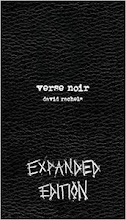
With an interest in Japanese noir, I couldn’t resist a cheap eBook about Japanese serial killers. My instincts said it looked like a piece of self-published crap, but the price was only $2.99. Unsurprising moral of the story: Trust your instincts. Most of the write-ups in Japanese Serial Killers: True Tales of 13 Notorious Murderers read like underdeveloped Wikipedia entries. Favorite moment in the book: the sentence that ends [citation needed]. FOOTNOTE: Just got curious and checked . . . they are Wikipedia entries! Ha!



































